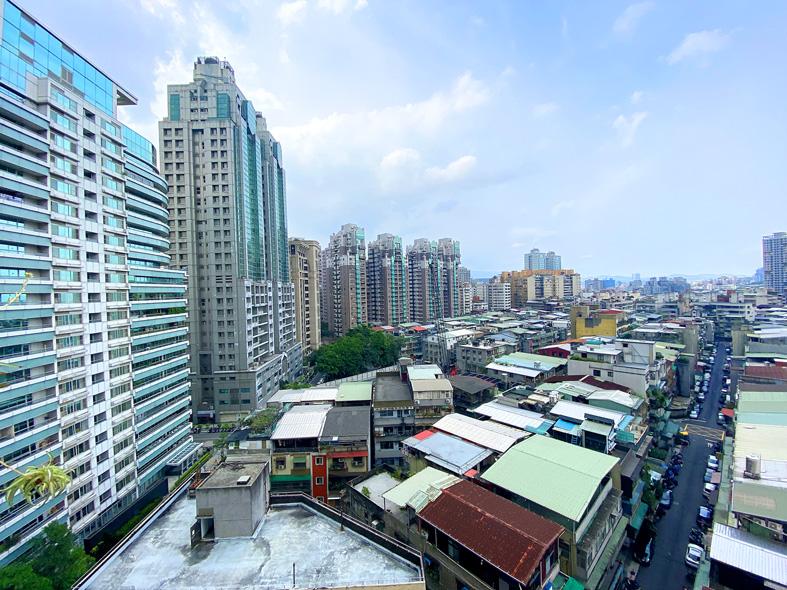The number of unoccupied houses nationwide totaled 876,000 units last year, or 11.94 percent of all houses, the Ministry of the Interior said in a report issued on Thursday.
Almost 30 percent of empty houses were owned by companies, suggesting that many corporate property owners engage in house hoarding, the ministry said.
Excluding developers and builders, companies still owned 20 percent of empty houses, it said.

Photo: CNA
The report is based on housing units’ electricity use and considers properties that use less than 60 kilowatt-hours per month as unoccupied.
The study contradicts Ministry of Finance reports saying that house hoarding subsided and there is no need for housing tax increases.
To rein in property price increases due to house hoarding, the central bank in March capped the loan-to-value ratio at 40 percent for firms and 50 percent for individuals buying their fourth or more.
The interior ministry found that New Taipei City had the highest number of unoccupied houses at 152,000, followed by Kaohsiung with 117,000; Taichung with 105,000; Taoyuan with 102,000; Tainan with 78,000; and Taipei with 68,000.
The report said that 33.47 percent of corporate-owned empty houses were held by companies that owned more than 10 houses.
Individual owners of more than 10 houses held 18.74 percent of all empty houses, it said.
A domestic COVID-19 outbreak in May prompted the central bank to postpone planned measures to rein in house hoarding, even though property and construction lending continued to rise, defying expectations of a downturn.
Separately, Miaoli County-based tile producer Champion Building Materials Co (冠軍建材) yesterday said that it is seeking to reverse losses this year by expanding its domestic market share and booking income from the sale of a production facility in China.
Champion last year incurred losses of NT$403 million (US$14.41 million), or losses per share of NT$0.93, the company told its annual general meeting in Jhunan Township (竹南) on Tuesday, citing sharp competition from low-end producers.
However, the situation might improve this year, as Champion sold an idle production facility in Kunshan, China, amid rising real-estate prices in the emerging high-tech production hub, it said.
The transaction generated NT$1.08 billion in profit, it said.
Revenue contribution from Champion’s China business was 25 percent last year, while the rest came from the domestic market, the company said.

When an apartment comes up for rent in Germany’s big cities, hundreds of prospective tenants often queue down the street to view it, but the acute shortage of affordable housing is getting scant attention ahead of today’s snap general election. “Housing is one of the main problems for people, but nobody talks about it, nobody takes it seriously,” said Andreas Ibel, president of Build Europe, an association representing housing developers. Migration and the sluggish economy top the list of voters’ concerns, but analysts say housing policy fails to break through as returns on investment take time to register, making the

‘SILVER LINING’: Although the news caused TSMC to fall on the local market, an analyst said that as tariffs are not set to go into effect until April, there is still time for negotiations US President Donald Trump on Tuesday said that he would likely impose tariffs on semiconductor, automobile and pharmaceutical imports of about 25 percent, with an announcement coming as soon as April 2 in a move that would represent a dramatic widening of the US leader’s trade war. “I probably will tell you that on April 2, but it’ll be in the neighborhood of 25 percent,” Trump told reporters at his Mar-a-Lago club when asked about his plan for auto tariffs. Asked about similar levies on pharmaceutical drugs and semiconductors, the president said that “it’ll be 25 percent and higher, and it’ll

CHIP BOOM: Revenue for the semiconductor industry is set to reach US$1 trillion by 2032, opening up opportunities for the chip pacakging and testing company, it said ASE Technology Holding Co (日月光投控), the world’s largest provider of outsourced semiconductor assembly and test (OSAT) services, yesterday launched a new advanced manufacturing facility in Penang, Malaysia, aiming to meet growing demand for emerging technologies such as generative artificial intelligence (AI) applications. The US$300 million facility is a critical step in expanding ASE’s global footprint, offering an alternative for customers from the US, Europe, Japan, South Korea and China to assemble and test chips outside of Taiwan amid efforts to diversify supply chains. The plant, the company’s fifth in Malaysia, is part of a strategic expansion plan that would more than triple

Taiwanese artificial intelligence (AI) server makers are expected to make major investments in Texas in May after US President Donald Trump’s first 100 days in office and amid his rising tariff threats, Taiwan Electrical and Electronic Manufacturers’ Association (TEEMA, 台灣電子電機公會) chairman Richard Lee (李詩欽) said yesterday. The association led a delegation of seven AI server manufacturers to Washington, as well as the US states of California, Texas and New Mexico, to discuss land and tax issues, as Taiwanese firms speed up their production plans in the US with many of them seeing Texas as their top option for investment, Lee said. The